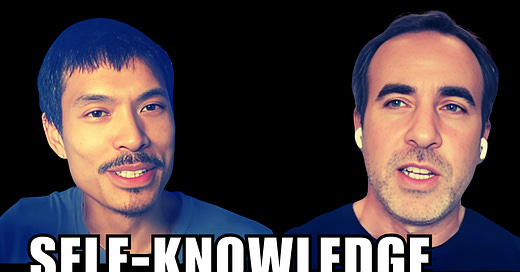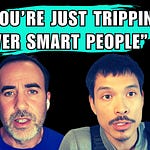In this episode of the ABCs for Building the Future Podcast, we delve into the boundaries of consciousness and the Markov Blanket concept. We explore questions like where consciousness ends and the rest of the world begins, inspired by Patrick House's book '19 Ways of Looking at Consciousness.' The discussion covers the free energy principle, nested Russian Doll structures, and how these ideas influence our product, Epistemic Me, to model evolving belief systems. We also touch on integrating such advanced theories into practical applications for health and wellness, training AI, and enhancing user experiences through understanding causal structures in Jobs to Be Done.
Resources and Links
Nineteen Ways of Looking At Consciousness
Official page for "Lights On" by Annaka Harris
Michael Levin Lab at Tufts University
BBC Earth – Ayumu chimpanzee memory test (YouTube)
Why Epistemic Me Matters
“How can AI understand us if we don’t fully understand ourselves?”
We solve for this by create programmatic models of self, modeling belief systems, which we believe are the basis of defense against existential risk.
In the longevity tech space, we create tools that meet users where they are, helping them make better decisions, form healthier habits, and align with their deepest values.
Get Involved
Epistemic Me is building the foundational tools to make this vision a reality—and we’re doing it in the open. Here’s how you can join the movement:
Check out the GitHub repo to explore our open-source SDK and start contributing.
Subscribe to the podcast for weekly insights on technology, philosophy, and the future.
Join the community. Whether you’re a developer, researcher, or someone passionate about the intersection of AI and humanity, we want to hear from you. Email me anytime!
FAQs
Q: Why does this matter for AI?
A: Because without shared values, we can’t align AI. Belief systems that scale and unify are essential to building tools that serve humanity, not destroy it.
Q: What is Epistemic Me?
A: It’s an open-source SDK designed to model belief systems and make AI more human-aligned.
Q: Who is this podcast for?
A: Entrepreneurs, builders, developers, researchers, and anyone who’s curious about the intersection of technology, philosophy, and personal growth. If you’ve ever wondered how to align AI with human values—or just how to understand yourself better—this is for you.
Q: How can I contribute?
A: Visit epistemicme.ai or check out our GitHub to start contributing today.
Q: Why open source? A: Transparency and collaboration are key to building tools that truly benefit humanity.
Q: Why focus on beliefs in AI?
A: Beliefs shape our understanding of the world. Modeling them enables AI to adapt to human nuances and foster shared understanding.
Q: How does Epistemic Me work?
A: Our open-source SDK uses predictive models to help developers create belief-driven, hyper-personalized solutions for applications in health, collaboration, and personal growth. Think of it as a toolkit for understanding how people think and making better tools, apps, or decisions because of it.
Q: How is this different from other AI tools?
A: Most AI tools are about predictions and automation. Epistemic Me is about understanding—building models that reflect the nuances of human thought and behavior. And it’s open source!
Q: How can I get involved?
A: Glad you asked! Check out our GitHub.
Q: Who can join?
A: Developers, philosophers, researchers, scientists and anyone passionate about the underpinnings of human beliefs, and interested in solving for AI Alignment.
Q: How to start?
A: Visit our GitHub repository, explore our documentation, and become part of a project that envisions a new frontier in belief modeling.
Q: Why open-source?
A: It’s about harnessing collective intelligence for innovation, transparency, and global community involvement in shaping belief-driven solutions.
P.S. If you haven’t already checked out my other newsletter, ABCs for Growth—that’s where I have personal reflections on personal growth related to applied emotional intelligence, leadership and influence concepts, etc.
P.S.S. Want reminders on entrepreneurship, growth, leadership, empathy, and product?
Follow me on..













Share this post